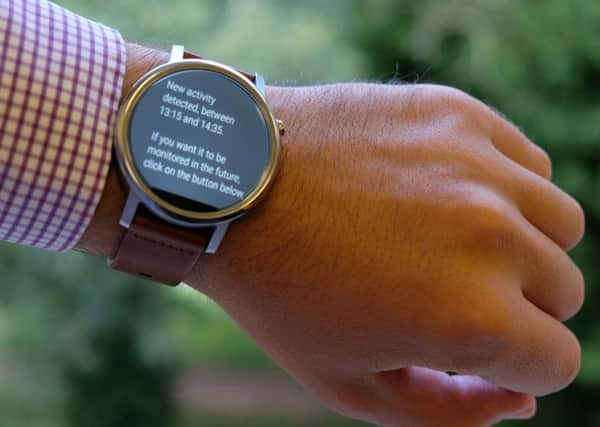Big Brother smart watches that monitor every move on the horizon


Scientists are working on an artificially intelligent (AI) system that takes the idea of activity tracking to another level.
The watches will know when a routine task, such as washing dishes or brushing teeth, has been left undone and provide a “helpful” reminder.
Advertisement
Hide AdAdvertisement
Hide AdThey could serve as memory joggers for the elderly, promote healthy lifestyles, assist in health care and aid rehabilitation after injury.
But they could also be used to analyse consumer behaviour and track the performance of factory workers, one of the researchers behind the invention admitted.
Dr Hristijan Gjoreski, from the University of Sussex, said: “The assembly worker usually performs some set of activities in order to assemble the product. This kind of device can monitor automatically what the worker is doing and remind him if he forgets to do some sort of activity.”
He added that his group was talking to companies that might be interested in commercially developing the gadget, which could be available in three to five years.
Similar to traditional activity trackers, the new smart watch would use inputs from accelerometer sensors while adding a vital time element.
A key difference is that it does not rely on preprogramming.
The software is able to learn about new behaviour patterns and identify consecutive episodes of activity, such as unloading the washing machine and hanging the clothes out to dry.
“If you have a sequence of activities you’re supposed to do, it could remind you of the next step,” said Dr Gjoreski.
Advertisement
Hide AdAdvertisement
Hide Ad“Activity-recognition systems usually fail because they are limited to recognising a predefined set of activities, whereas of course human activities are not limited and change with time.”
With existing activity tracker technology, a walk interrupted by two short stops would be interpreted as three journeys. The new system would understand that one walk, resuming after each short pause, is being taken.
Dr Daniel Roggen, of the sensor research technology group at the University of Sussex, said: “As well as for fitness and lifestyle trackers, this can be used in healthcare scenarios and in fields such as consumer behaviour research.”
The research will be discussed at the British Science Festival this week in Brighton, and will be presented later this month at the International Symposium on Wearable Computers in Hawaii.